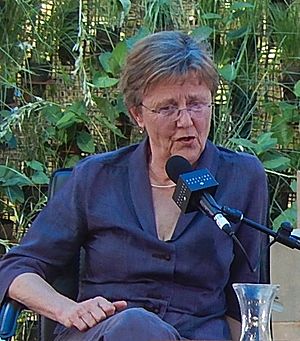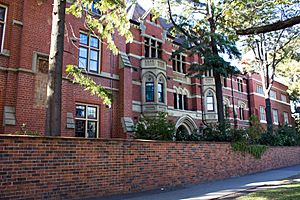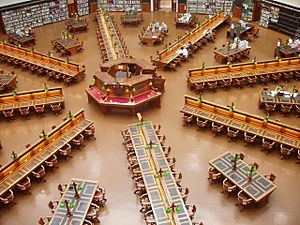Helen Garner facts for kids
Quick facts for kids
Helen Garner
|
|
|---|---|

Garner in 2015
|
|
| Born | Helen Ford 7 November 1942 Geelong, Victoria, Australia |
| Occupation | Novelist, short-story writer, journalist |
| Education | University of Melbourne |
| Notable works | Monkey Grip The First Stone Joe Cinque's Consolation This House of Grief |
| Spouse | Bill Garner (1967–71) Jean-Jacques Portail (1980–85) Murray Bail (1992–2000) |
| Children | Alice Garner |
Helen Garner (née Ford, born 7 November 1942) is an Australian novelist, short-story writer, screenwriter and journalist. Garner's first novel, Monkey Grip, published in 1977, immediately established her as an original voice on the Australian literary scene—it is now widely considered a classic. She has a reputation for incorporating and adapting her personal experiences in her fiction, something that has brought her widespread attention, particularly with her novels Monkey Grip and The Spare Room (2008).
Throughout her career, Garner has written both fiction and non-fiction. She has also written for film and theatre, and has consistently won awards for her work, including the Walkley Award for a 1993 Time magazine report. Adaptations of two of her works have appeared as feature films: her debut novel, Monkey Grip, and her true-crime book Joe Cinque's Consolation (2004)—the former released in 1982 and the latter in 2016.
Garner's works have covered a broad range of themes and subject matter. She has written three true-crime books: The First Stone, Joe Cinque's Consolation, which won the Ned Kelly Award for Best Crime Book, and, in 2014, This House of Grief. The Australian Broadcasting Corporation (ABC) site has characterised her as one of Australia's "most important and admired writers", while The Guardian referred to her as "Australia's greatest living writer".
Contents
Early life
Garner was born Helen Ford to Bruce and Gwen Ford (née Gadsden) in Geelong, Victoria, the eldest of six children. Her sister Catherine Ford is also a writer of fiction. Garner described her upbringing as being in an "ordinary Australian home – not many books and not much talk".
Garner attended Manifold Heights State School, Ocean Grove State School and then The Hermitage in Geelong, where she was the head prefect and dux. She left Geelong after her high school graduation at the age of 18 to study at the University of Melbourne, residing at Janet Clarke Hall, and graduating with a Bachelor of Arts degree with majors in English and French. One of her teachers at the University of Melbourne was the poet Vincent Buckley.

Between 1966 and 1972, Garner worked as a teacher at various Victorian high schools. In 1967, she also travelled overseas and met Bill Garner, whom she married in 1968 on their return to Australia, aged 25. Her only child, the actor, musician and writer Alice Garner, was born in 1969. Garner's first marriage ended in 1971.
In 1972 she was fired from her teaching job after publishing in The Digger, a counter-culture magazine, an anonymous account of frank and extended discussions she had with her students about sex education.
Career
Early career and fiction writing
Garner came to prominence at a time when Australian writers were relatively few in number, and Australian women writers were, by some, considered a novelty. Australian academic and writer, Kerryn Goldsworthy, writes that "From the beginning of her writing career Garner was regarded as, and frequently called, a stylist, a realist, and a feminist".

Her first novel, Monkey Grip (1977), relates the lives of a group of fledgeling artists, single parents, and welfare recipients living in Melbourne share-houses. The novel, set in inner-city Melbourne suburbs Fitzroy and Carlton, was written in the domed Reading Room at the State Library of Victoria, after Garner's teaching dismissal. Years later she stated that she had adapted it directly from her personal diaries and based the relationship between Nora and Javo on a relationship she had with a man at the time. Other peripheral characters in the book were based on people in Garner's own social circle from Melbourne share-houses. Monkey Grip was very successful: it won the National Book Council Award in 1978 and was adapted into a film in 1982.
Goldsworthy suggests that the success of Monkey Grip may well have helped revive the careers of two older but largely ignored Australian women writers, Jessica Anderson and Thea Astley. Thea Astley wrote of the novel that "I am filled with envy by someone like Helen Garner for instance. I re-read Monkey Grip a while ago and it's even better second time through". Critics have retrospectively applied the term Grunge Lit to describe Monkey Grip, citing its depiction of urban life and social realism as being key aspects of later works in the subgenre.
In subsequent books, she has continued to adapt her personal experiences. Her later novels are: The Children's Bach (1984) and Cosmo Cosmolino (1992). In 2008 she returned to fiction writing with the publication of The Spare Room, a fictional treatment of caring for a dying cancer patient, based on the illness and death of Garner's friend Jenya Osborne. She has also published several short story collections: Honour & Other People's Children: two stories (1980), Postcards from Surfers (1985) and My Hard Heart: Selected Fictions (1998).
In 1986, Australian academic and critic, Don Anderson, wrote of The Children's Bach: "There are four perfect short novels in the English language. They are, in chronological order, Ford Madox Ford's The Good Soldier, Scott Fitzgerald's The Great Gatsby, Hemingway's The Sun Also Rises and Garner's The Children's Bach." The Australian composer Andrew Schultz wrote an opera of the same name which premiered in 2008.
Garner said, in 1985, that writing novels was like "trying to make a patchwork quilt look seamless. A novel is made up of scraps of our own lives and bits of other people's, and things we think of in the middle of the night and whole notebooks full of randomly collected details". In an interview in 1999, she said that "My initial reason for writing is that I need to shape things so I can make them bearable or comprehensible to myself. It's my way of making sense of things that I've lived and seen other people live, things that I'm afraid of, or that I long for".
Not all critics have liked Garner's work. Goldsworthy writes that "It is certainly the case that Garner is someone whose work elicits strong feelings ... and people who dislike her work are profoundly irritated by those who think she is one of the best writers in the country". Novelist and reviewer, Peter Corris wrote in his review of Monkey Grip that Garner "has published her private journal rather than written a novel". Goldsworthy suggests that this statement implies that she is not really a writer. Craven, though, argues that her novella, The Children's Bach, "should put paid to the myth of Helen Garner as a mere literalist or reporter", arguing, in fact, that it "is light years away from any sprawling-tell-it-all naturalism, [that] it is concentrated realism of extraordinary formal polish and the amount of tonal variation which it gets from its seemingly simple plot is multifoliate to the point of being awesome".
Screen writing
She has written three screenplays: Monkey Grip (1982), written with and directed by Ken Cameron; Two Friends (1986), directed by Jane Campion for TV; and The Last Days of Chez Nous (1992), directed by Gillian Armstrong.
Critic Peter Craven writes that "Two Friends is arguably the most accomplished piece of screenwriting the country has seen and it is characterised by a total lack of condescension towards the teenage girls at its centre".
Non-fiction writing
Garner has written non-fiction from the beginning of her career as a writer. She wrote for this magazine from 1972 to 1974. In 1993, she won a Walkley Award for her Time magazine account of a murder trial following the death of a toddler at the hands of his stepfather.
One of her most famous and controversial books is The First Stone (1995). It was a best-seller in Australia but also attracted considerable criticism. Garner had received hate-mail from women in Australia who accused her of derailing the feminist debate. She has since commented: "Sometimes I would have these kind of panic attacks caused by the hostility that some people showed towards me. I guess I knew there was going to be trouble, but the vitriolic nature of it gave me a bit of a shock".
Garner's other non-fiction books are True Stories: Selected Non-Fiction (1996), The Feel of Steel (2001), Joe Cinque's Consolation (2004) and This House of Grief – The Story of a Murder Trial (2014). She also contributed to La Mama, the Story of a Theatre (1988). Joe Cinque's Consolation was adapted into a feature film in 2016. The film had premiers at both the Melbourne Film Festival and the Toronto International Film Festival, where it was generally well received, although detractors felt that the absence of Garner's voice from the story impacted the film—James Robert Douglas, writing for The Guardian, stated the film adaptation contained the "bones but not the wisdom of Garner's book".
Themes
Garner has covered a broad range of themes in her work, ranging from feminism, love, loss, grief, ageing, illness, death, betrayal and the duality of the human psyche, particularly in manifestations of "good" and "evil".
Some of her novels address the anarchic nature of desire and the orderly force of the institution of 'family'; the similarities and differences between collective households and nuclear families; the significance and the language of housework; [and] the idea of 'the house' as image, symbol, site and peace." Garner has become known for her depiction of Australian life, both in the city and rural regions–she was born in Geelong and spent much of her life in Melbourne, approximately 75 kilometres (46 miles) from her hometown. Anne Myers, in an article written for The Sydney Morning Herald, recognised Garner's portrayals of the location of Melbourne as essential to Monkey Grip itself as any character: "Garner was writing Melbourne into the literary landscape and for the first time I saw my own world reflected back at me".
Joe Cinque's Consolation, This House of Grief and to a lesser extent The First Stone, were commentaries on the justice system in Australia, how (and if) it adequately responds to crime, as well as the question of culpability.
Craven comments that Garner is "always an extremely accurate writer in terms of the emotional states she depicts". Many of her books touch upon the inexplicable, irrational, and dark side to human behaviour–as well as Garner's attempts to understand human behaviour and sociology, which often eludes the average Australian and wider society, as well as the Australian justice system. In The Fate of The First Stone, Garner writes that she believes most people would prefer to keep incomprehensible stories of extreme behaviour at "arm's length" because it is "more comfortable, easier". Peter Craven wrote that Garner is fearless in her honesty: "she shows us what she does not know or is too blind to see: she shows us the poverty of the self in the face of impercipience caused by sentiment or anger, prejudice, ignorance or dumb incapacity." He further commented on her ability to sometimes identify with the story's perceived villain, "[the] transgressor who at some level shares our own fingerprints". Similarly, various critics and journalists have highlighted Garner's portrayal of "ordinary people" caught up in extraordinary experiences, or the everyday person who, "under life's unbearable pressures", has "surrendered to their darker selves". James Wood, in a profile on Garner published in The New Yorker, stated that her work is absorbed in issues of gender and class, which he writes are "not categories so much as structures of feeling, variously argued over, enjoyed, endured, and escaped".
Personal life
After her marriage to Bill Garner ended, Garner married two more times: to Jean-Jacques Portail (1980–85) and Australian writer Murray Bail (born 1941), from whom she separated in the late 1990s. She is no longer married. In her work, she has been open about her struggle with depression.
She has one child, Alice Garner (b. 1969), from her marriage to Bill Garner. Alice Garner is also an author, as well as a musician, teacher and historian.
In 2003, a portrait of Garner, titled True Stories, painted by Jenny Sages, was a finalist in the Archibald Prize.
Awards and nominations
- Monkey Grip
- 1978 – National Book Council award
- The Children's Bach
- 1986 – South Australian Premier's Awards
- Postcards from Surfers
- 1986 – New South Wales Premier's Literary Awards, Christina Stead Prize for Fiction
- Two Friends
- 1987 – New South Wales Premier's Literary Awards, Television Writing Award
- 1987 – Best Screenplay in a Telefeature
- Cosmo Cosmolino
- 1993 – Shortlisted for the Miles Franklin Award
- Did Daniel Have to Die?
- 1993 – Walkley Award for Best Feature Writing, published in Time
- True Stories: Selected Non-fiction
- 1997 – Nita Kibble Literary Award
- Joe Cinque's Consolation
- 2004 – ABIA Book of the Year
- 2005 – Ned Kelly Awards joint winner for Best True Crime
- The Spare Room
- 2008 – Victorian Premier's Literary Awards, Vance Palmer Prize for Fiction
- 2008 – Queensland Premier's Literary Awards Fiction Book Award
- 2009 – Barbara Jefferis Award
- This House of Grief
- 2015 – Ned Kelly Award – Best True Crime
- 2015 – Longlisted Stella Prize
- 2015 – Shortlisteds ABIA General Non-Fiction Book of the Year.
- 2015 - Shortlisted New South Wales Premier's Literary Awards
- 2016 – Windham–Campbell Literature Prize for non-fiction works
- 2016 – Western Australian Premier's Book Awards – non-fiction
- 2016 – Western Australian Premier's Book Awards – overall prize
- Everywhere I Look
- 2017 – Shortlist for The Indie Book Awards
- 2006 – Melbourne Prize for Literature
- 2019 – Australia Council Award for Lifetime Achievement in Literature
- 2020 – Australian Book Industry Awards' Lloyd O'Neil Award and Hall of Fame
- 2023 – Australian Society of Authors' ASA Medal

